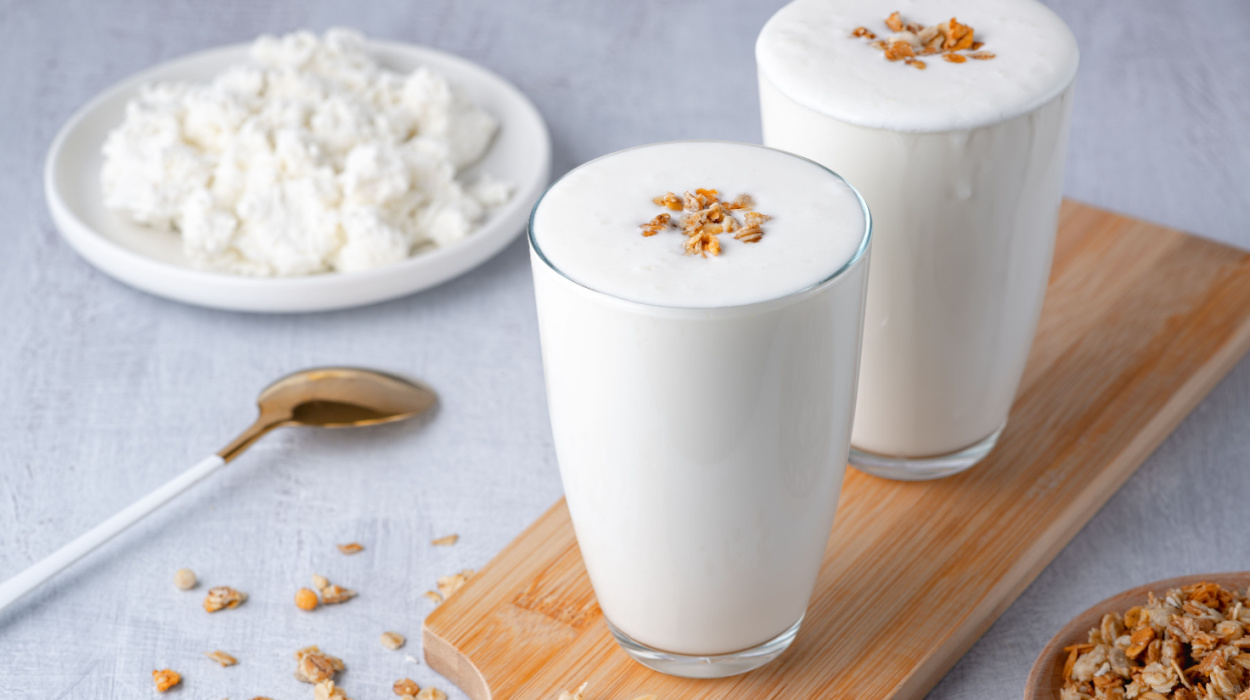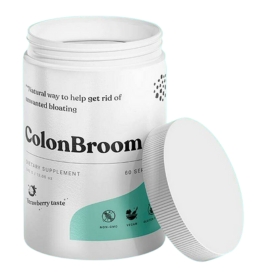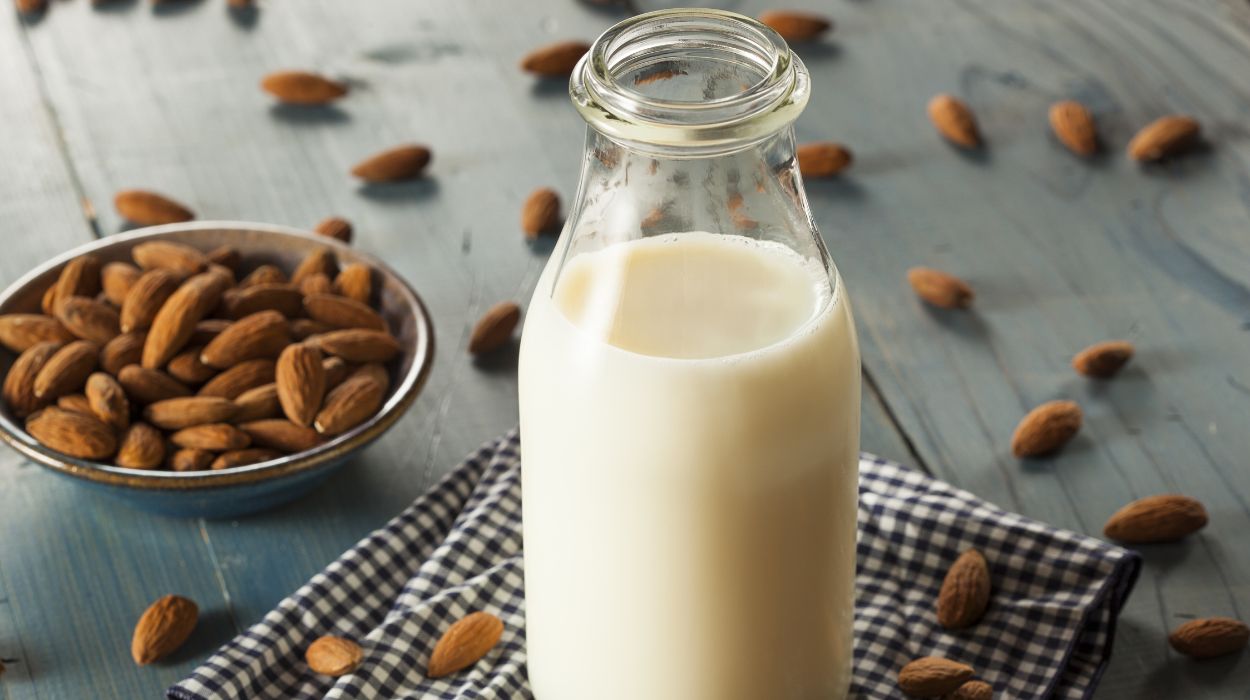
Dairy milk is a widely consumed beverage, however, not all individuals can drink it. Roughly 68% of people worldwide have lactose intolerance.[1] They lack lactase,[2] the enzyme needed to break down lactose, a carbohydrate found in dairy foods.
If you are lactose-intolerant, drinking milk can cause unpleasant gastrointestinal side effects[3] such as gas, bloating, and diarrhea. People with milk allergies[4] must also avoid milk to prevent allergic reactions. Luckily, there are many plant-based milk alternatives that may be easier to digest. However, the best milk for gut health depends on the individual.
7 Types Of Milk That Heal Your Gut
If cow’s milk is causing you digestive upset, you’re not alone. Many people are turning to other types of milk to improve their digestive health. Consider these 7 alternatives to cow’s milk for better gut health:
- Goat’s Milk.
- Almond Milk.
- Soy Milk.
- Oat Milk.
- Cashew Milk.
- Rice Milk.
- Hemp Milk.
7 Best Types Of Milk For Better Gut Health

Cow’s milk can be difficult for many people to digest, particularly those with milk allergies or those who are lactose-intolerant. It’s estimated that one in fifty people[5] in the U.S. have a medically confirmed milk allergy and over half the world’s population cannot digest lactose..
Because of this, plant-based milks have grown in popularity in recent years. As a result, dairy milk consumption[6] has decreased. Consider the following cow milk alternatives.
FEATURED PARTNER OFFER

Colon Broom
- Reduces bloating and relieves constipation
- Improves general gut health
- Increases fiber intake
- Supports healthy cholesterol levels
- Promotes healthy circulation
Goat’s Milk
Goat’s milk does contain lactose, as all mammal milk[7] does, however, some people find it easier to digest than cow’s milk.
Nutritionally, goat’s milk is not too dissimilar[8] to cow’s milk. Goat’s milk has 4.5 grams of carbohydrate[9] per serving and cow’s milk[10] has 4.67 grams.
However, the fat molecules[11] in goat’s milk are smaller than those in cow’s milk. For some, this may be the determining factor that could make goat’s milk easier to tolerate.
Almond Milk
Almond milk is made by soaking almonds overnight and then blending them with water. Many plant-based milks[12] are made using similar methods.
Note that almonds lose most of their beneficial fiber[13] during the milking process. Compare half a cup of raw almonds,[14] which has 12 grams of fiber, with half a cup of almond milk,[15] which has less than one gram of fiber.
However, just because almond milk may not enhance gut health, it does not make it harmful for gut health, either. Almond milk can be gentler on the gut than dairy for many individuals.
Soy Milk
Soy is a common food allergy[16] and should be avoided for anyone allergic to it. However, for those who are not allergic to soy, soy milk can be an excellent choice for your coffee, cereal, and smoothies.
Fermented soy milk,[17] especially, has been shown to make positive changes in the gut microbiome. This is most likely due to soy’s probiotics which feed beneficial bacteria in the digestive tract. Healthy adults can consume between 15-25 grams of soy protein[18] daily.
Oat Milk
Oat milk is a lactose-free milk that can provide additional health benefits where cow’s milk falls short.
Specifically, oat milk contains vitamins, minerals, and dietary fiber[19] that dairy milk lacks. The dietary fiber in oat milk can help lower cholesterol and blood lipids by delaying gastric emptying.
Depending on your health goals, it’s worth noting that oat milk is generally higher in carbohydrates than dairy milk, but lower in fat.
Cashew Milk
Not only is cashew milk safe for the people who can’t digest cow’s milk, but cashew byproducts, such as fermented cashew milk[20] can promote a healthy gut. Fermented cashew milk contains beneficial gut bacteria strains and has properties that protect bacteria in the digestive tract.
Fermented cashew milk also has high amounts of antioxidants,[21] which reduce disease risk by fighting off free radicals that can damage your cells.
Rice Milk
Rice milk can be beneficial for gut health in healthy individuals. One study[22] found that proteins in rice milk help decrease inflammation. However, for those with an allergy to rice milk, rice milk had the opposite effect, creating more inflammation and gut barrier leakage.
This reinforces the idea of bio-individuality in nutrition. What works for one person may not work for another. It’s important to avoid any food you have an allergy or suspected allergy to. However, if you are not allergic to rice milk, it may prove to be a lactose-free, gut-friendly milk for you.
Hemp Milk
In a study conducted on mice, scientists found that foods made from hemp[23] seeds not only provide essential nutrients but can also decrease inflammation. Furthermore, hemp foods may improve the integrity of the gut lining.
Hemp milk is also filled with plant-based protein[24] which can have positive effects on the gut microbiome.[25]
The Link Between Milk And Gut Health

Intolerances And Allergies
There are two main links between dairy and gut health: lactose intolerance and milk allergies.[26]
Here are the differences:
Lactose intolerance is due to the absence of lactase. In this case, the carbohydrate in dairy cannot be digested. Lactose intolerance can be uncomfortable but is usually not serious.[27] It also takes a few hours for symptoms to develop.
A milk allergy is an allergic reaction to the protein found in milk. An allergy can be life-threatening, with symptoms ranging from digestive discomfort to hives, wheezing, itching, and shortness of breath. Symptoms of a milk allergy will usually occur immediately after ingesting the milk.
The reactions of both an intolerance and an allergy happen once the food has entered the digestive system.
Irritable Bowel Syndrome
Although the symptoms of irritable bowel syndrome,[28] or IBS, are similar to lactose intolerance, these conditions are not necessarily linked.[29] A person can have IBS without lactose intolerance, or lactose intolerance without IBS.
If you have gas from IBS or lactose intolerance, consider simple ways to relieve bloating such as farting, managing stress, and eating foods that can help with bloating. For some people, dairy foods like yogurt may actually help relieve bloating due to the probiotics in the food.
For additional gut support, ask your doctor about taking vitamins for gut health or pills that can help you debloat.
Is Milk Good For Gut Health?
This depends on the individual. On one hand, dairy helps increase beneficial bacteria[30] in the digestive system, which can improve gut health. Additionally, dairy can diversify[31] the gut microbiome, providing different strains of bacteria that can also promote a healthy gut. In this sense, dairy can be beneficial for gut health.
However, despite its positive influence on the gut microbiota, roughly 68% of people worldwide cannot tolerate lactose. Many others may be allergic to milk. For these people, milk can be harmful to the gut.
Summary
Given the prevalence of lactose intolerance, many people are favoring plant-based milk to avoid unpleasant digestive symptoms from cow’s milk. There is no particular milk that is best for gut health. There are many options to choose from.
Some plant-based milks enhance gut health, while others simply do not deplete gut health. Rather, they serve as neutral, non-dairy alternatives. While each type of milk offers different nutritional properties and health benefits, you will have to experiment with different kinds of milk to find the one that is most gut-friendly for you.
Frequently Asked Questions
What milk is best for gut health?
This depends on the person. For the many people who are lactose-intolerant, plant-based milks are good for gut health because they do not contain any lactose.
Which milk is best for IBS?
IBS is experienced differently by different people. Some people experience painful bloating and gas, while others may struggle with diarrhea or constipation. A plant-based milk will likely be better than dairy milk, but each person must experiment for themself.
Is almond milk better for the gut than dairy milk?
Possibly. If you are not lactose-intolerant and do not have a milk allergy, dairy milk may work better for you than almond milk. However, because lactose intolerance is common, many people will find almond milk easier to digest.
What is the best dairy milk alternative to avoid bloating?
It’s possible that any milk could cause bloating. Plant-based milk will not aggravate lactose intolerance. However, this does not guarantee that you won’t experience bloating from plant-based milk.
Is dairy milk good for a bad gut?
Yes and no. Dairy milk has nutrients and probiotics that feed beneficial bacteria in the gut which can build a healthy gut microbiome. However, dairy milk can irritate the gut in many people. This is individual.
Is oat milk better for your gut than dairy?
It can be. Assuming you have no allergy or sensitivity to oats, oat milk may be gentler on the gut than dairy for some individuals.

